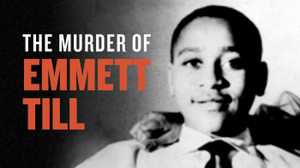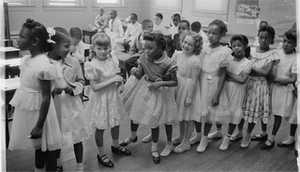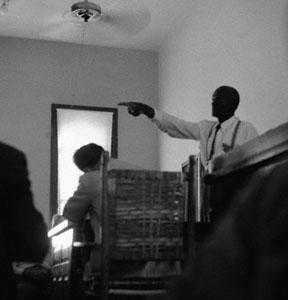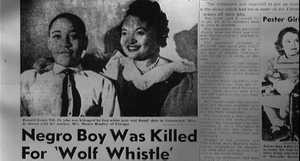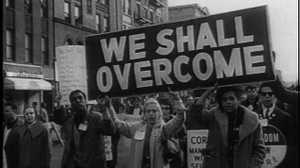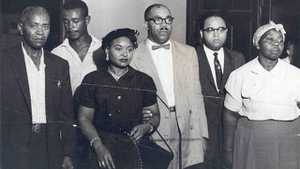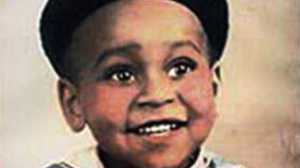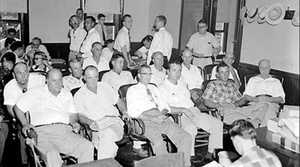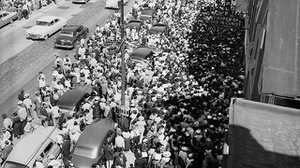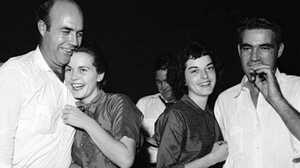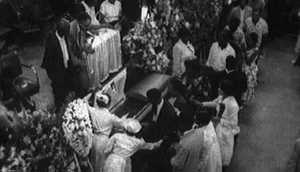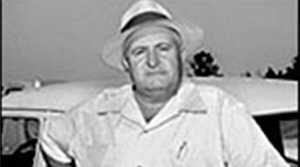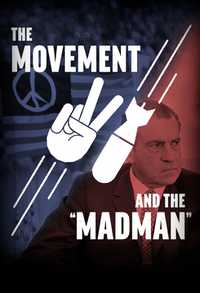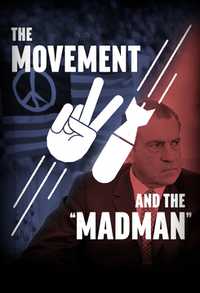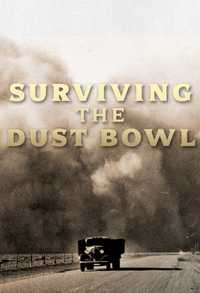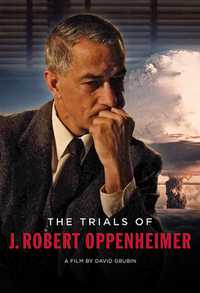Stock footage of Tallahatchie River w/commentary: This is the muddy back woods Tallahatchie River where a weighted body was found alleged to be that of young Emmett Till.
Mamie Till Mobley, Mother: I saw a hole, which I presumed, was a bullet hole and I could look through that hole and see daylight on the other side. And I wondered was it necessary to shoot him?
Stock footage of commentator on the trial: Here is Money, Mississippi, the home of Roy Bryant. It was here, that the Chicago Negro boy Emmett Till is alleged to have paid unwelcome attention to Roy Bryant's most attractive wife.
David Lee Jordan, Mississippi State Senator: When white womens was on the streets you had to get off of the street. That was a way of life. And all a white woman had to say was, "That nigger kinda looked at me or sassed me." So we're talkin' about a way of life that in this part of the country that was enforced by law.
Stock footage of commentator on the trial: This was the home of Moses Wright. It was from this shack the state alleges Emmett Till was taken by Roy Bryant & J.W. Milam.
Wheeler Parker, Cousin: The house was a dark as a thousand midnights. You couldn't see. It was like a nightmare. I mean -- I mean someone come and stand over you with a pistol in one hand and a flashlight and you're 16 years old; it's a terrifying experience.
William Winter, former Mississippi Governor: The Till Case held the whole system up for inspection by the rest of the country and by the rest of the world. It was the beginning of the focusing on the problems between the races in the Deep South that culminated in the ultimate Civil Rights battles of the, of the rest of the 50s and, and, and into the 60s.
Rose Jourdain, Journalist: I think black peoples' reaction was so visceral. And I think it was probably more than anything else, in terms of the mass civil rights movement, the spark that, that launched it. Everybody knew we were under attack and that attack was symbolized by the attack on a 14-year-old boy.
William Winter: When one drives through the lowest hills and looks out at the sweep of those fields below, flat as a pancake as far as the eye could see, it's breath taking. Those who have not been to the Delta find themselves gasping at the sight as they come over the lowest hills and see that expanse of flat agricultural land.
Narrator: It was the summer of 1955 when Emmett Till arrived in Mississippi from Chicago. His family had worked cotton for generations, but this trip would be Emmett's introduction to the Delta, known as "the most southern place on earth."
Stock footage Mississippi Citizen's Council film on Forrest, Mississippi: This is Mississippi. Today a situation exists in Mississippi that is unlike the situation in most states in the nation. In some sections of the state there is a preponderance of colored citizens. This situation has brought problems, it has created challenges, but most important of all, it has inspired a social system to meet the challenge. In every community in Mississippi, there is segregation of the races. Drinking fountains are segregated. Restrooms are segregated. The local theater is segregated.
Clara Davis, Mississippi Resident: You never in any way said anything that they didn't like. You didn't disagree with 'em on a whole. You just didn't do that. If a white person did something to you, you had no recourse at all. People disappeared. We don't know what happened to them. They just disappeared.
Narrator: In the 75 years before Emmett Till set foot in Mississippi, more than 500 black people had been lynched in the state. Most were men who had been accused of associating with white women.
Betty Pearson, Mississippi Resident: Part of that culture was that the women were put on pedestals and they were some sort of, ah idealization of whatever it means to be woman or to be female. There was an almost irrational fear of black men as if every black man was ready to attack or rape a white woman if you gave him a chance. I can remember when my father died, Sammy, the black man who worked for him was there and I threw my arms around his neck. And he pulled away from me. He could not have that, you know physical show of affection, of sharing grief, or whatever. Black men did not touch white women.
William Winter: Many white Southerners, perhaps most Deep South Southerners had convinced themselves that black people were relatively happy in their -- in their segregated relationships with white people. Most white people, I think, had had convinced themselves that this was a defensible social system in which they lived.
Ernest Withers, Photographer: I had a cousin that was living in Mississippi and was walking down the sidewalk down near downtown in Tunica and didn't get off the sidewalk and the man slapped him and knocked him off the sidewalk. And he got up, and instead of killin' the white man like he wanted, he just start walkin' and never stopped until he got to Memphis and never stopped until he got up to Chicago.
Narrator: Hundreds of thousands of black people fled Mississippi for Chicago in the years between the World Wars. One-way train fare of $11.10 took them to a different world. Neighborhoods and schools were segregated, but the city offered the kind of freedom black Mississippians could only dream about.
Mamie Till: Chicago was a land of promise and they thought that milk and honey was everywhere. And so it was a lot of excitement leaving the South, leaving the cotton fields. You could hold your head up in Chicago.
Narrator: Mamie Carthan arrived in Chicago at the age of two. An only child, young Mamie was the hope of her family of former sharecroppers. She graduated from high school at the top of her class, and became one of the first black women in town to hold a civil service job. In 1940, Mamie married soldier Louis Till, and one year later, their son, Emmett, was born. In 1945, Mamie got word that Private Till had died in Europe. All she received of his possessions was a signet ring inscribed with his initials, L.T. Emmett, her only child, was four years old. A childhood case of polio left him with a stutter, but by the time he was a teenager, Emmett Till had grown into a cocky, self-assured boy who loved to be the center of attention.
Richard Heard, Classmate: When we first met, we were in gym in Mr. Long's gym period. I remember Emmett raising his shirt up to about his navel and start making his belly roll, just waves of fat rollin' and it just broke us up. I mean the whole gym went crazy. He was that kinda kid.
Wheeler Parker: Anything goin' on, he's in the middle of all -- all of it and he just loved to play ball. He just loved jokes. He would pay people to tell him jokes. If there was a group there, Emmett was in front. And he was the lively one. He was the one that everybody kind of looked to. Natural born leader.
Narrator: In June of 1955, black Chicago swung to a new kind of music called rock 'n' roll. A Supreme Court decision had struck down school segregation the year before. Emmett finished seventh grade, and in July, he turned 14. It was summer, and it was a good time to become a young man.
Magnolia Cooksey-Mathious, Classmate: I knew Emmett Till. We went to grammar school together. And Emmett was a fun young man, just like any other young teenager. The boys wore polyester pants, crepe soled shoes. I would wear flared skits with the crinoline underneath, you must have the crinoline. And we were doing the bop, that's the bebop, and we just danced and had fun. We were just all good friends.
Narrator: In August, Emmett's great uncle, Moses Wright, visited Chicago and invited Emmett and his cousin Wheeler home to Mississippi. Before she let them go, Mamie schooled the boys on the ways of the South.
Mamie Till: I let them know that Mississippi was not Chicago. And when you go to Mississippi, you're living by an entirely different set of rules. Ah, it is, 'yes, ma'am' and 'no, ma'am', 'yes, sir' and 'no, sir'. And, Beau if you see a white woman coming down the street, you get off the sidewalk and drop your head. Don't even look at her.
Wheeler Parker: The concern for Emmett was that he could be, with his fun-loving, free-spirited way of living, he could get in trouble, could have a lot of problems. He was 14, but he just turned 14. He was just 13 just a few weeks before we went down there.
Mamie Till: He thought I was exaggerating, which I was. I was trying to exaggerate. If I could go high enough, I -- things could soak into his head that, "You have to be very careful."
Narrator: As Emmett packed his bags, Mississippi was set to explode. Two black men had recently been killed for registering black voters. And a push to implement the new law on school desegregation had whites from the delta to the statehouse spitting fire.
James Eastland, Senator: You are not going to permit the NAACP to take over your schools. You are not going to permit the NAACP to control your state.
William Winter, Governor: It was argued in coffee shops all over the Deep South, that "If we give on this, then we'll, we'll start giving on everything else and the first thing you know, we won't have a segregated society, and black people will be taking over in this part of the country."
Moses Newson, Journalist: A lot of leadership was going around making outrageous threats and claiming they weren't going to obey the law and that sort of thing. Consequences was that almost anything could happen to anybody at anytime down there.
Narrator: On August 19th, Mamie gave Emmett the ring that had belonged to his father. The next morning, Emmett and his mother grabbed his bags and rushed off to the 63rd Street station.
Mamie Till: He was running up the steps to try to make it to the train and I said, "Emmett, or Beau" -- I called him Beau, I said, "Where are you going? You haven't kissed me good-bye. And how do I know I'll ever see you again?" And he looked at me and he said, "Aw, Mama." He kind of scolded me for saying something like that. But he turned around and he came back and he kissed me good-bye and he said, "Here. Take this." He pulled his watch off and gave it to me. He said, "I won't need this where I'm going." I said, "What about your ring?" He said, "Oh, I'm gonna show it off to the fellas." And with that, he was up the steps and on his way to get on the train.
Narrator: Emmett rode the Illinois Central 16 hours out of Chicago to the Mississippi Delta.
Wheeler Parker: We went to South, near the beginning of cotton-picking time, late August, and we picked cotton for a half a day and we would go swimming, run the snakes out the river. We had a lot of fun.
Narrator: Emmett's family lived on the outskirts of Money, a whistle-stop town in the heart of Delta cotton country.
Clara Davis: The town of Money was one street with maybe five or six stores, but that's all. Just one, one street. Wasn't much, wasn't really a town.
Narrator: At one end of Money was Bryant's grocery, which made a business of selling candy to black kids and provisions to field hands from nearby plantations. Roy Bryant, a 24 year-old ex-soldier and his wife Carolyn owned the grocery and not much else. The Bryants lived with their two boys in cramped rooms behind the store. Roy's half-brother J.W. Milam helped out around the grocery. The 235-pound Milam was a hard drinking man with a reputation for being tough on anyone who got in his way. On a steamy Wednesday afternoon, Emmett and seven other teenagers piled into Moses Wright's old Ford and headed to Bryant's grocery.
Wheeler Parker: The day that we went to the store in Money, we were picking cotton first half of the day, and the second half, because it was so hot -- my uncle drove the car and we took off to Money to get some refreshments, just general things you buy in a store.
Narrator: Roy Bryant was out of town, leaving his wife Carolyn alone behind the counter when Emmett and his cousins pulled up. Other customers were sitting outside, talking and playing checkers in the cool of the shade. One or two at a time, the boys drifted into the store and back out again with a cold drink or a piece of candy. Then, Emmett went in and bought two cents' worth of bubblegum. According to witnesses, on his way out of the store, Emmett turned to Carolyn Bryant and whistled. She stormed out.
Wheeler Parker: We all got a-scared and someone said, "She's going to get a pistol." That's when we became afraid. Said, "She's going to the car to get a pistol." And as she went to the car, we all jumped in my uncle's car. We were goin' pretty fast and dust is flying behind us. And, of course, Emmett Till begged us not to tell my grandfather what had took place. And we didn't. This was on a Wednesday. And we didn't tell him what had taken place. Ah, so Wednesday went by, Thursday went by, nothin'. Friday. We forgot about it.
Moses Wright, description of kidnapping: Sunday Morning about 2:30, I heard a voice at the door. And it said, "This is Mr. Bryant." And said they wanted the boy that did the talk at Money. And when I opened the door there was a man standing with a pistol in one hand and a flashlight in the other.
Wheeler Parker: It was like a nightmare. I mean it's -- I mean someone come and stand over you with a pistol in one hand and a flashlight and you're 16 years old it's a terrifying experience, very terrifying.
Moses Wright, description of kidnapping: So we marched around through two rooms and I found the boy in the third room in the bed with my baby boy and they told him to get up and put his clothes on.
Narrator: Moses Wright pleaded with the two men. He's only 14, and he's from up North. "Why not give the boy a whipping," Wright begged, "and leave it at that?"
Wheeler Parker: The two in the next room, my cousin and uncle they never woke up. My uncle Simmie did wake up, but they told him to go back to sleep. He was 12 years old. And I just said, "Hell, I'm fixing to die."
Narrator: J.W. Milam turned to Moses Wright. "How old are you, preacher?" He asked. "64," Wright replied, "You make any trouble, you'll never live to be 65."
Moses Wright, description of kidnapping: Near to the car they asked a question, "Is this the right one?" And I heard a voice say, "Yes" and they drove off toward Money with him.
Wheeler Parker: Nobody talked to anybody. The house was a dark as a thousand midnights. You couldn't see...and when they left, I was still afraid and so I'm waitin' for them to come back. It was that Sunday morning, early Sunday morning.
Warren Hampton, Mississippi Resident: I was playin' beside the road and I saw Mr. Milam in the truck coming by and it had a, had a cover over the door, we called a tarpaulin, and I heard somebody hollerin' on the truck.
Willie Reed, Mississippi Resident: I could hear all this beatin' and I could hear this beatin' and I could here this cryin' and cryin' and beatin', and I'm saying to myself, "They beatin' somebody up there." I heard that beatin' even, before I got to, even before I got to the barn. I passed, they still beatin', they still beatin'. I hear it. Milam came out. So when he said "Did you hear anything?" I saw him he had khaki pants on, had a green nylon shirt, and a .45 on his side. So I said, "Naw." I said, "I didn't hear anything," I said, "anything."
Oudie Brown, Mississippi Resident: I was coming through there that mornin'. Too Tight was out there washing the truck out. Out washing J.W. Milam's truck out. I said, "What all that blood come from?" He laughed. The boy laughed. That's what he did. He said, "There's a shoe here. There's one of his shoes here." I said "Who!?" That's the way I said it. I say "Who?" "Emmett Till's shoe."
Narrator: In Chicago, a desperate Mamie Till notified the local newspapers of Emmett's disappearance. In Mississippi, the family alerted the sheriff and then began to search for any sign of the boy along riverbanks and under bridges, "Where black folks always look," Emmett's uncle said, "when something like this happens." The next day, Roy Bryant was arrested for kidnapping. J.W. Milam was at a store in nearby Minter City when the Leflore County sheriff caught up with him.
Oudie Brown: Said, "J.W., I got a writ for ya." He throwed his head up there, just like that. He spoke of it again, he went over it again. He said, "I got a writ for you. Is you goin?" "Hell no, that's shit you talking." No longer than two hours, the high sheriff come back. The high sheriff come in there, didn't even knock on no door or nothin'. Walked in there say, "J.W. Milam I come at ya'. I'm gonna carry you dead or alive. You just as well to get ready to go." Yeah.
Narrator: On August 31, three days after Emmett Till had disappeared, a boy fishing in the Tallahatchie noticed a body caught on a gnarled root in the muddy water. He informed Tallahatchie County sheriff Clarence Strider.
Clarence Strider Jr., Son of Mississippi Sheriff: My dad called me and asked me did I have a boat in the river. And I told him I did. Then he said, "Well, we'll be down there in a little while," and he sent deputies down here to go with me and we took the boat and went up the river. It was in a curve in a drift and a foot was stickin' up and we tore into the drift and got to him and, you know, got him out. Then we carried him to the, up to the other landin' and put him in the hearse.
Narrator: Emmett's body had been weighed down with a 75-pound cotton gin fan tied around his neck with barbed wire. The boy was so badly beaten that Moses Wright could identify Emmett only by his father's ring. Mamie Till was in Chicago, surrounded by worried family and friends, when she was told that her only child was dead.
Mamie Till: Those words were like arrows sticking all over my body. My eyes were so full of tears until I couldn't see. And when I began to make the announcement that Emmett had been found and how he was found, the whole house began to scream and to cry. And that's when I realized that this was a load that I was going to have to carry. I wouldn't get any help carrying this load.
Narrator: By the time Mamie received her son's body back in Chicago, two weeks after she had kissed him goodbye, Emmett's murder was front page news. His body was taken to a funeral home owned by A.A. Rayner, who had promised Mississippi authorities that he would keep the casket nailed shut. When Mamie Till asked him to open it up, Rayner refused.
Mamie Till: I asked him, "Mr. Rayner, do you have a hammer?" I said, "I haven't signed anything, and I haven't made any promises, and if you can't open those box -- that box, I can,"
Harry Caise, Mortician: And we opened the casket, there was a terrible odor that came from the body because the body had been in the water and began to deteriorate. Mr. Rayner was, he told the mother, he said, "If I was you I wouldn't look at this body because this body in such a horrible condition." She said, "Mr. Rayner, I want to see my son."
Mamie Till: And I decided then that I would start at his feet and work my way up, maybe gathering strength as I went. I paused at his midsection, because I knew he would not want me looking at him. But I saw enough that I knew he was intact. I kept on up until I got to his chin and then I -- I was forced to deal with his face. I saw that his tongue was choked out. I noticed that the right eye was lying on midway his cheek, I noticed that his nose had been broken like somebody took a meat chopper and chopped his nose in several places. As I kept looking, I saw a hole, which I presumed was a bullet hole and I could look through that hole and see daylight on the other side. And I wondered, was it necessary to shoot him? Mr. Rayner asked me, he said "Do you want me to touch the body up?" I said, "No, Mr. Rayner, let the people see what I've seen." I was just willing to bear it all. I think everybody needed to know what had happened to Emmett Till.
Narrator: Mamie's decision would make her son's death a touchstone for a generation. At a church on the South Side of Chicago, Emmett Till's mutilated body would be on display for all to see.
Magnolia Cooksey-Mathious: It was on a Sunday afternoon. I won't ever forget, it was a Sunday afternoon. The church was very calm; the line was very orderly.
Mamie Till: I thought that pretty soon the crowd would die down. It looked like all of Chicago was there.
Harry Caise: Well they brought the children with them because Emmett was 14 years old and they wanted the younger kids to see what happened to Emmett. They were mad, they were angry.
Magnolia Cooksey-Mathious: And as we were led into the church, my girlfriends and myself, we walked up to the casket and it was covered with a glass and we all looked down; this was our friend laying lookin' like a monster.
Mamie Till: They said that about one in every five had to be assisted out of the building. They would just go into a faint.
Rose Jourdain: I think black peoples' reaction was so visceral. Everybody knew we were under attack and that attack was symbolized by the attack on a 14-year-old boy.
Wheeler Parker: As far as I was concerned, that wasn't him there, yet at the same time, as confusing as it may sound, it was him. But I didn't accept it. I just in my mind I kept sayin', "I'll see him again," you know. And I guess to me it didn't happen. But it did happen.
Narrator: Fifty thousand people in Chicago had seen Emmett Till's corpse with their own eyes. When the black magazine Jet ran photos of the body, black Americans across the country shuddered.
Richard Heard: It was grotesque. I mean it was just ... It blew my mind. I couldn't sleep at night. It was traumatic for me for -- for months. I mean, it touched us all.
Narrator: Mainstream newspapers and magazines spread the story of the 14-year-old black boy who'd been brutally killed for whistling at a white woman.
Rose Jourdain: It stunned white America. Most white Americans at that time were saying things such as the Emmett Till murder had happened back in slavery times. That these kinds of things were not of their generation, that they no longer happened in America. And this said to them clearly, "Hey, it's right here. It is now."
Narrator: Roy Bryant and J.W. Milam admitted having taken Emmett Till, but claimed they'd let him go. Now, with the eyes of the nation turning to Mississippi, the state appointed a special prosecutor and filed charges.
Stock Footage, Prosecutor Chatem w/charges: D.A. Chatem: The federal indictment is that they did willfully, unlawfully, feloniously and of their malice of forethought kill and murder Emmett Till, a human being.
Narrator: Scores of reporters descended on the Delta. Television networks chartered a plane to send footage to New York for the nightly news. The Associated Press fielded queries from Paris, Copenhagen, Tokyo. The Till case had become a major international news story. Under the glare of the spotlight, white Mississippians began to close ranks. Local stores collected $10,000 in countertop jars for Bryant and Milam. Every lawyer in the county joined their defense team.
William Winter: People of the socioeconomic level of the two defendants in this case were obviously looked down on by the more aristocratic ah, whites almost ah, with the same disdain that they looked down on blacks. But they were still white folks. And when push came to shove the -- the white community rallied in support of them against a, a, a young black person for whom they had even greater disdain.
John Herbers, Journalist: The atmosphere among whites in Tallahatchie county and other-- the whole surrounding area was one of absolute scorn at the fact that these men were being put on trial for their lives. And the cynicism ah, was ah, usually cached in very crude jokes. One of them was "Isn't that just like a nigger to swim across the Tallahatchie with a gin fan around his neck?"
Stock Footage, Man on the Street Interviews with whites about trial: White Man: I can't understand how a civilized mother could put a dead body of her child on public display. White Woman: I'm almost convinced that the very beginning of this was by a communistic front. White Man: Well sir, I'll tell ya' right now, if he gets justice they'll turn him a loose. If I was on the grand jury that is what I would do.
Narrator: Among African Americans, there was outright fear. Too Tight Collins, who worked for J.W. Milam and had been seen washing blood from Milam's truck, disappeared. The message to black people was clear: hide what you know; hide even what you think, or face the consequences.
Stock Footage, Man on the Street Interviews with two black men about trial: Interviewer: Young man do you think these two men should be indicted? Black Man: I really don't know sir. Interviewer: What do you mean you don't know? Black Man: I don't know whether they should or not. Interviewer: Have you studied the case by reading the papers perhaps? Black Man: Yes sir. Interviewer: And you don't know whether they should be indicted? Black Man: No sir. Interviewer: Thank you very much. Black Man: You're welcome.
Narrator: On September 19th, less than three weeks after Emmett's body was found, Roy Bryant and J.W. Milam's trial for murder opened in Sumner, Mississippi, which touted itself as "a good place to raise a boy." The air in the courtroom, a reporter wrote, was "as heavy and oppressive as the moss that hangs from the cypress trees."
Mamie Till: In the courtroom they recorded 118 degrees, and, of course, there was no air conditioning. Ah, they had the ceiling fans that were only stirring the air up, making it hotter when it reached your body.
Narrator: On the first day of the trial, presiding judge Curtis Swango named the jury -- all white men from Bryant and Milam's home county.
Betty Pearson: I remember looking at the -- at that jury and even though I knew a good many of the men who were on the jury and, and they looked mean to me. I would have hated to have gone up against any of those guys.
Narrator: Tallahatchie county sheriff and plantation owner Clarence Strider was responsible for locating witnesses and gathering evidence against Bryant and Milam.
John Herbers, Journalist: Sheriff Strider was a big, fat, plain talking, obscene talking sheriff you would expect to find in the South. His actions at the trial were more I think, not to so much to say justice, or what was going on, but to be sure that his courtroom was totally segregated.
Ernest Withers, Photographer: The man had laid it out that "We got 22 seats over here for you white boys. And we've got four seats over here for you colored boys. We don't mix 'em down here. We ain't going to mix 'em. And we don't intend to. You ain't goin' to be with the white folks and the white folks ain't goin' to be with you and y'all might be (Unintell.), but ain't gonna be no love nest between black and white folk.
Narrator: Strider consigned black reporters and Detroit Congressman Charles Diggs to a card table on the sidelines. Strider greeted them as he passed with a cheery "Hello, niggers."
Stock Footage, Sheriff Strider on NAACP: We never have any trouble until some of our Southern niggers go up North and the NAACP talks to 'em and they come back home. If they would keep their nose and mouths out of our business we would be able to do more and enforcing the laws of Tallahatchie County and Mississippi.
John Herbers: The reaction of reporters from out of the South was one of just absolute amazement. They knew that there were strange things going on in places like Sumner, but they did not know it would be quite like that. They were really surprised at what they found. At the same time, of course, they wrote about it with great relish because it was a good story. It had sex, it had murder, it had mystery.
Narrator: When Mamie Till arrived, she had to make her way through an unsympathetic crowd gathered on the courthouse lawn.
Stock Footage, Mamie Till Arrives at Trial News Conference: Interviewer: What do you intend to do here today? Mamie: To answer any questions that my, that the attorneys might ask me to answer. Interviewer: How do you think you could possibly be a help to them? Mamie: I don't know, just by answering whatever questions that they ask me. Interviewer: Do you have any evidence bearing on this case? Mamie: I do know that this is my son.
Narrator: Mamie Till testified that the body she'd examined and buried was indeed her son. In their cross-examination, Bryant and Milam's attorneys peppered her with hostile questions, and then presented the main argument for the defense: The corpse pulled from the Tallahatchie River was not Emmett Till.
Mamie Till: They summed up by saying, "Isn't it true that you and the NAACP got your heads together and you came down here and with their help, you all dug up a body and you have claimed that body to be your son? Isn't it true that your son is in Detroit, Michigan with his grandfather right now?"
Narrator: With Sheriff Strider and courtroom sentiment clearly on the side of the defendants, reporters began their own desperate search for witnesses.
Warren Hampton: Black people wasn't speaking out about the Emmett Till Case at that particular time because they knew that it could happen to them. The blacks feared for their lives and their family's lives. Because -- those white folks were for real. So it was just like you know hush hush you know so I was told to keep my mouth shut and that's what I did.
Narrator: Two days into the trial, reporters got a lead on a young sharecropper named Willie Reed who might be willing to talk.
Willie Reed, Mississippi Resident: And I was in the cotton field and I was pickin', I was pickin' cotton, pickin' cotton, and I looked across the field and there was about seven or eight peoples comin' across the field towards me, was white and black comin' that way. And then they began to question me about this here. "Did you see anything?" So I told 'em what I saw.
Narrator: Putting his life at risk, Willie Reed agreed to step forward.
Willie Reed: Well, when you walked in that courtroom and you know what you -- that you're going testify. Then you look at all these white folks and everybody lookin' at you and they've got they frowns on their face and everything. You see 'em. They be lookin' at you, rollin' their eyes and lookin' at you. Yeah. Whites looking at you. (Laughs) It was somethin'.
Narrator: Reed spoke in a voice barely louder than a whisper. He'd seen Roy Bryant, J.W. Milam, and one other white man with Emmett Till early that Sunday morning, and had heard the sounds of a beating coming from Milam's shed. After delivering his testimony, Reed was smuggled out of Mississippi. When he reached Chicago, he was hospitalized with a nervous breakdown. The prosecution's best witness was Moses Wright, who had clearly seen the men who took Emmett Till from his home. Wright had been in hiding since the night of the kidnapping, and had been threatened with death. But there, in the searing heat of the Delta courtroom, the 64-year old sharecropper had his say.
Ernest Withers: One of the attorneys asked, "Do you know the man that came to your house that night to get Emmett Till out of your house?
Narrator: Moses Wright stood and pointed first at Roy Bryant, then at J.W. Milam. "Thar he," he said. Wright later claimed he could feel the blood boil in hundreds of white people in the courtroom. But, he said, "I had decided to tell it like it was."
Moses Newson: That was a dramatic moment. That took an awful lot of courage for him to get up there and do what he did. I think he had decided that he was going to do it no matter what happened.
Narrator: After he testified, Wright left his cotton blooming in the field, his old car sitting at the station, and slipped onto the train to Chicago. He would never again live in Mississippi. The trial drew to a close after only five days. In his summation, the lead defense attorney warned members of the jury that their ancestors would turn over in their graves if Bryant and Milam were found guilty. "Every last Anglo-Saxon one of you," he said, "has the courage to free these men."
Mamie Till: As the jury retired, the black people who were standing around the walls began to ease out of the door. I said, "It's time for us to go." Congressman Diggs said, "What, and miss the verdict?" I said, "Congressman, this is one verdict you don't want to be present to hear."
Narrator: The crowd in the courtroom waited in the heat. Reporters overheard members of the jury laughing and joking in the jury room. In just over an hour, the jury returned.
Stock Footage, News Anchor Reports Till Verdict tape: In the Emmett Till Murder trial, the all white jury has acquitted the two white defendants accused of killing the 14-year-old Negro youth. The jury foreman said the deciding factor was the states' failure to prove the identity of the body pulled from a river near Sumner Mississippi.
Narrator: A juror later revealed that the jury had stalled to "make it look good." They wouldn't have taken so long to return to the courtroom, he said, "if [they] hadn't stopped to drink pop."
Mamie Till: The verdict came in "not guilty". You could hear guns firing. I mean it was almost like a 4th of July celebration, or it was almost as if the White Sox had won the pennant in the city of Chicago. It was just it just -- oh, it -- it was a mess.
Narrator: After the trial, sheriff Clarence Strider told reporters, "I hope the Chicago niggers and the NAACP are satisfied."
Clarence Strider Jr.: People are used to doin' thang normal around here. (Laughs) And they just tried to ruin the thing. They thought they could run over the judge and the sheriff and everybody over there. They thought that they, you know, could just take over, but they didn't.
Stock Footage, Interview with Milam & Bryant after the Verdict: Interviewer: How do you folks feel now that it's all over? Roy, how about you? Roy Bryant: I'm just glad it's over with. Interviewer: J.W.? Milam: I am too. Interviewer: And Mrs. Bryant? Mrs. Bryant: I feel fine. Interviewer: And how about you Mrs. Milam? Mrs. Milam: Fine.
Narrator: Reports of the acquittal made front page headlines across the United States, and set off an international firestorm. "The life of a Negro in Mississippi," one European paper observed, "is not worth a whistle." From Boston to Los Angeles, black people packed meeting halls and spilled into the streets to hear Mamie Till tell her story.
Stock Footage, Mamie Comments on Trial Verdict: And what I saw was a shame before God and man. And the way the jury chose to believe the ridiculous stories of the defense attorneys. I just can't go into detail to tell you the silly things, the stupid things that were brought up as probabilities and they swallowed it like a fish swallows a hook. Just anything, just any excuse to acquit these two men.
Narrator: Protected from further prosecution, Roy Bryant and J.W. Milam sold their story to a reporter for Look Magazine for $4,000. Their account appeared just four months after the acquittal.
Milam Bryant Scratch: We took him and we was just gonna whip him, scare some sense into him. Back of the house is a tool shed. Two rooms about 12 feet square. We walked him in there and took turns smashing him across the head with the .45. First my brother, then me, then him, then me. We put him back in the truck. We knew what we was going to do. There's a spot about a mile and a half from the bridge where the banks are steep. It was just the spot.
I held up the gun. I fired and the Chicago boy twisted around and caught it right in his ear. We tied the gin fan to his neck with barbed wire and rolled his body into 20 feet of muddy water.
For three hours that morning we had a big old fire in the yard. Damn if that nigger didn't have crepe sole shoes. You know how hard they are to burn?
Narrator: If there were others involved, as Willie Reed and Moses Wright had testified under oath, Milam and Bryant did not name them. Mamie Till went to Washington to press the Federal Government to re-open the case. Despite thousands of letters protesting Mississippi's handling of the murder, President Dwight Eisenhower and FBI Director J. Edgar Hoover ruled out a federal investigation. Eisenhower didn't even answer Mamie Till's telegram.
No one ever did time for the killing of the 14 year-old black boy from Chicago. But his murder, and the trial and acquittal of his killers, sent a powerful message: If change was going to come, people would have to put themselves on the line. Contributors to Civil Rights groups soared. And 100 days after the death of Emmett Till, Rosa Parks refused to give up her seat to a white person, and the Montgomery bus boycott began.
Mamie Till: When people saw what had happened to my son, men stood up who had never stood up before. People became vocal who had never vocalized before. Emmett's death was the opening of the Civil Rights movement. He was the sacrificial lamb of the movement.
Betty Pearson: I do believe that nationally, or at least across the South, the Emmett Till trial and the result of that trial somehow spurred the Civil Rights Movement. As if this was either the last straw or maybe it was the spark.
Moses Newson: People were thoroughly disgusted at what happened in that situation. And it made an awful lot of people realize that they themselves had to get involved and do something. It was just a magnificent reaction to a very ugly thing that had taken place in this country.
Card: After the trial, black customers boycotted Bryant's store, forcing it out of business.
J.W. Milam and Roy Bryant never faced additional charges connected with the murder.
They died in Mississippi.
Card: Mamie Till returned to Chicago, remarried, taught public school for 24 years, and continued to speak publicly about her son's murder.
She died on January 6, 2003 at the age of 81.
